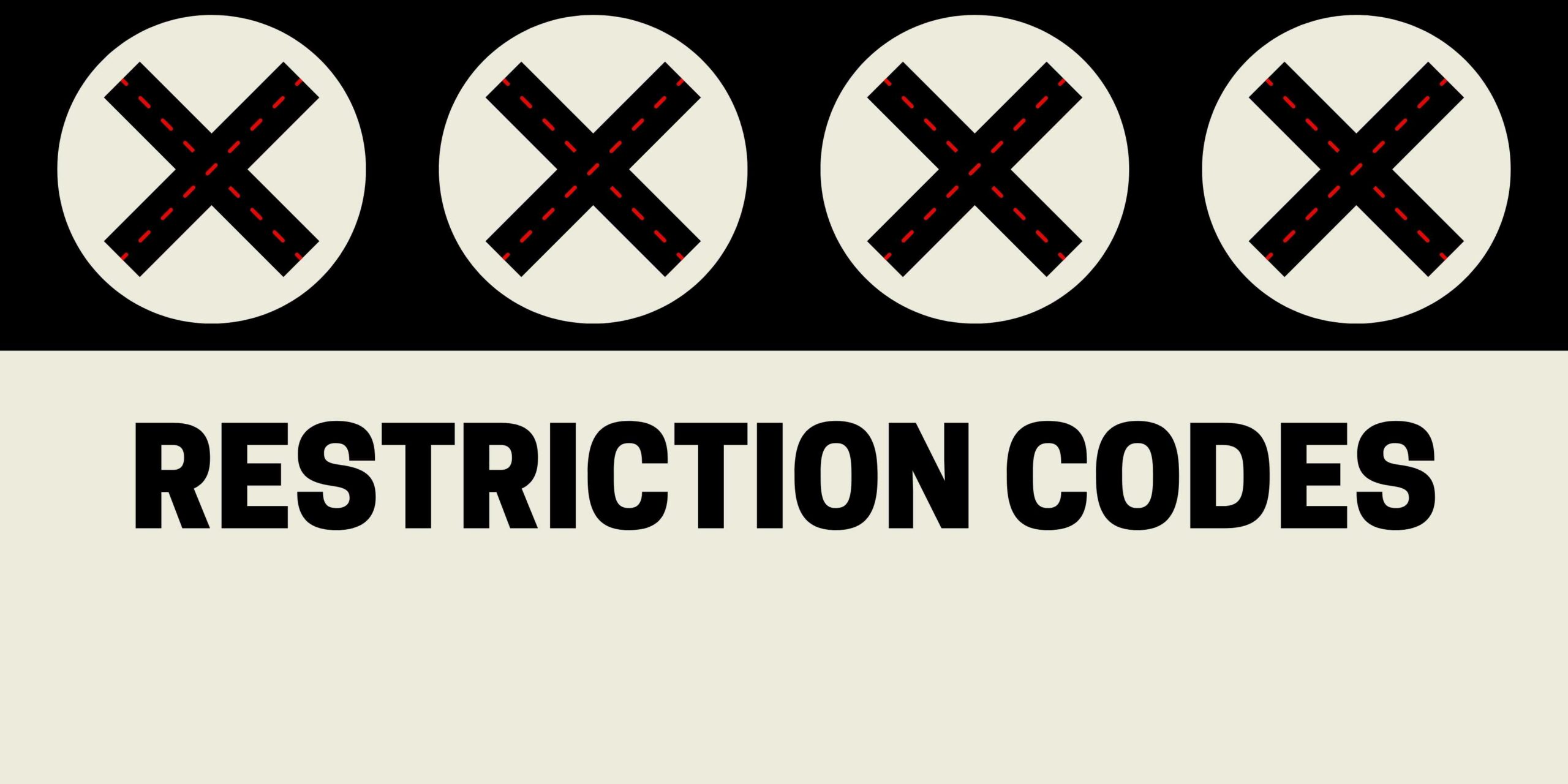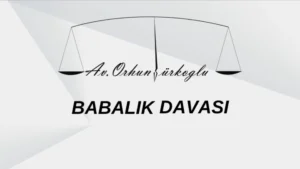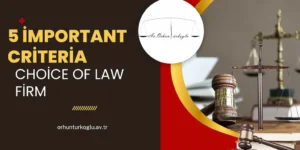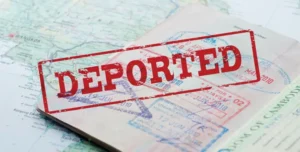1- WHAT IS A RESTRICTION CODE?
A restriction code is a mark that indicates what type of administrative restriction has been imposed on foreigners who are not Turkish citizens based on actions presumed to be unlawful. It also shows the reason for this restriction, meaning its factual cause. Restriction codes are abbreviated with various letters; these are:
- C Restriction Codes
- G Restriction Codes
- K Restriction Codes
- M Restriction Codes
- N Restriction Codes
- Restriction Codes
- V Restriction Codes
- Y Restriction Codes
These codes are divided into eight main sections.
2- HOW TO REMOVE A RESTRICTION CODE?
As stated above, restriction codes refer to limitations imposed on foreigners by the administration due to actions presumed to be unlawful. Therefore, to remove a restriction code, an application must first be made to the administration under the Administrative Jurisdiction Procedures Law, requesting its removal.
If the administration provides a negative response or does not respond at all, and 30 days (thirty days) pass from the date of application, a lawsuit can be filed at the administrative court within the 60-day (sixty-day) period to have the restriction lifted.
The competent court varies depending on which authority imposed the restriction code:
- If the restriction was imposed by the Provincial Immigration Administration, the competent court is the administrative court of that province.
- If the restriction was imposed by the Ministry, the competent court is the Ankara Administrative Court.
3- LEGAL EVALUATIONS REGARDING RESTRICTION CODE REMOVAL WITH MEANINGS AND HIGH COURT DECISIONS
3.1- Ç-101 Restriction Code: This code applies to foreigners who have violated visa, work permit, or residence permit regulations for less than three months. Foreigners under this code face an entry ban of three months.
3.2- Ç-102 Restriction Code: This code applies to foreigners who have violated visa, work permit, or residence permit regulations for more than three months up to and including less than six months. Foreigners under this code face an entry ban of six months.
3.3- Ç-103 Restriction Code: This code applies to foreigners who have violated visa, work permit, or residence permit regulations for more than six months up to and including less than one year. Foreigners under this code face an entry ban of two years.
3.4- Ç-104 Restriction Code: This code applies to foreigners who have violated visa, work permit, or residence permit regulations for more than one year up to and including less than two years. Foreigners under this code face an entry ban of two years.
3.5- Ç-105 Restriction Code: This code applies to foreigners who have violated visa, work permit, or residence permit regulations for more than two years up to and including less than five years. Foreigners under this code face an entry ban of five years.
3.6- Ç-106 Restriction Code: This code applies to foreigners who have violated visa, work permit, or residence permit regulations for more than five years, including five years. Foreigners under this code face an entry ban of seven years.
3.7- Restriction Code Ç-113: This is a restriction code applied to foreigners identified as having illegally entered or exited the country. In such cases, the foreigner in question is subjected to a two-year entry ban to the country. Recently, this restriction code has been frequently applied to foreigners who enter Turkey illegally.
Example Jurisprudence: According to the jurisprudence, the Ç-113 restriction code and deportation decision applied to a foreigner whose temporary protection status ended upon illegally exiting Turkey and subsequently illegally re-entering the country are lawful;
Council of State 10th Chamber, File No: 2016/3090 E., Decision No: 2021/4939 K.
It has been determined that the claimant, who first entered our country on 14/11/2013, does not have any information or documentation in the file indicating registration under temporary protection status or any application made by the claimant in this direction at that time. Even if the claimant was considered to be under temporary protection status at the stated date, it must be accepted that the claimant’s temporary protection status individually ended, as explicitly stipulated by Article 12 of the Temporary Protection Regulation, due to voluntarily leaving Turkey several times afterward. Additionally, considering that no administrative action was taken by competent authorities to continue temporary protection status under Article 13 of the Temporary Protection Regulation upon the claimant’s subsequent re-entry into Turkey, general provisions of Law No. 6458 must apply to the claimant who is determined not to be under temporary protection status. Therefore, there is no legal obstacle to processing the claimant’s case under Article 9 of the aforementioned law.
In this context, upon evaluation, it is evident that the claimant, determined not to be under temporary protection status, entered our country on different dates but continued to remain illegally without obtaining a visa or residence permit, and most recently was found to have entered our country illegally without a visa. Considering these facts, the claimant’s illegal presence constitutes a violation of public order. Consequently, the contested action prohibiting entry to the country, established under Article 9 of Law No. 6458, has been concluded as lawful.
3.8- Ç-114 Restriction Code:
The Ç-114 restriction code is imposed by the Provincial Migration Directorates on foreign nationals who have been subject to judicial proceedings. The foreign national is prohibited from entering the country for two years, and if they are within the country, a deportation decision is issued against them. If the foreign national files an administrative lawsuit against the deportation decision, the execution of the deportation decision is suspended.
Example Case Law:
The precedent states that the rejection of a foreign national’s short-term residence permit application by the administration due to the previously imposed Ç-114 restriction code, despite its removal, is unlawful.
Council of State 10th Chamber – Case No: 2016/938, Decision No: 2021/4947
The case involves a plaintiff who had been residing in Turkey under family residence permits granted to stay with their mother. The plaintiff applied for a short-term residence permit as their family residence permit was about to expire. However, this application was rejected on 04/09/2015 on the grounds that the plaintiff had a one-year entry ban due to the Ç-114 restriction record and, therefore, needed to obtain a special annotated visa appropriate to their purpose to enter Turkey.
Nevertheless, based on the documents in the case file, it was established that the plaintiff’s entry ban was lifted on 18/04/2013, and the plaintiff, who entered Turkey on 16/04/2013 with a special annotated visa, had been granted a family residence permit valid until 02/06/2015. Thus, as of the date of the decision, it was evident that the plaintiff no longer had an entry ban.
Accordingly, the defendant administration’s claim that “the plaintiff was subject to an entry ban” cannot be accepted as a legitimate reason for the administrative act in question. Moreover, since there was no legal obstacle preventing the plaintiff from applying to the relevant governor’s office for a short-term residence permit transition from a family residence permit, the requirement for the plaintiff to obtain a special annotated visa appropriate to their purpose was deemed unjustified.
In this context, rather than rejecting the plaintiff’s short-term residence permit application based on an alleged one-year entry ban and the necessity to obtain a special annotated visa, the application should have been evaluated based on other legal conditions required by law. Consequently, the administrative act rejecting the plaintiff’s short-term residence permit application was found to be unlawful
3.9- Ç-115 Restriction Code: Applied to foreigners imprisoned under the Turkish Penal Code (TCK) and subsequently released. Entry is prohibited for two years, and deportation procedures are initiated.
3.10- Ç-116 Restriction Code
The Ç-116 restriction code is applied when a foreigner sustains their livelihood through illegitimate means within Turkey. Also known as the “prostitution code,” once imposed, this restriction code results in a five-year entry ban for the foreigner. If the individual is within the country, deportation proceedings are initiated.
A precedent ruling states that a foreigner’s residence permit application cannot be rejected solely because the Ç-116 restriction code had been previously imposed and its duration had been completed. In other words, a foreigner who has previously been subject to the Ç-116 restriction code cannot be denied a short-term residence permit on the grounds that the restriction period has already been served.
Council of State, 10th Chamber
Case No: 2016/2382
Decision No: 2021/3224
It was determined that two separate Ç-116 restriction records (pertaining to foreigners posing a threat to public morality and public health, with a one-year ban) had been imposed on the plaintiff on 01/04/2010 and 05/11/2012. Consequently, the plaintiff was unable to enter Turkey due to these restriction records. However, after serving the required period, the restrictions expired, and the plaintiff entered Turkey on 23/02/2015, subsequently applying for a short-term residence permit.
Since there was no finding indicating that the plaintiff posed a threat to public order or public health after re-entering Turkey on 23/02/2015, the legal action rejecting the residence permit application solely based on the previous restriction records was deemed unlawful.
3.11- Ç-117 Restriction Code: It is the code applied to a foreign national working illegally within the country. With the application of this code to the relevant foreign national, deportation procedures are initiated, and a one-year entry ban is imposed.
A precedent ruling states that rejecting the citizenship application of a foreigner who previously had Ç-116 and Ç-117 restriction codes and was found to have engaged in prostitution, after their subsequent marriage and fulfillment of the necessary conditions, is unlawful.
Council of State, 10th Chamber 2016/2766 E., 2020/4436 K.
In the case subject to the dispute, the security investigation conducted by security units in the plaintiff’s locality revealed that the plaintiff was previously apprehended on 20/01/2001 in … , … district for being without a passport and violating visa regulations and, as a result of the proceedings, was deported by … Provincial Police Department on 23/01/2001. It was determined that on 29/05/2003, a restriction entry was recorded with the Ç(117) criminal code by the … border gate, and the plaintiff exited the country. On 17/09/2005, the plaintiff was apprehended by … Gendarmerie Command in relation to a prostitution case and subsequently deported by … Police Department. Later, on 21/04/2009, the plaintiff married a Turkish citizen, and it was determined that the marriage was maintained within a family union, that the couple had no children, that the plaintiff was in harmony with their surroundings, led a proper family life, and lived according to Turkish culture, customs, and traditions. Additionally, on 11/12/2012, in the … Governorship Citizenship Investigation and Research Commission Interview and Evaluation Form, it was determined that the plaintiff met the conditions specified in Article 16 of Law No. 5901. It was also understood that there was no record of any judicial or administrative action against the plaintiff, nor any record of an arrest.
Considering that, under Law No. 5901, if it is determined that the applicant does not meet the necessary conditions for citizenship or that the marriage was entered into for personal gain rather than as a genuine marital union, the request for citizenship may lawfully be denied. However, in the present case, there was no finding that the plaintiff failed to meet the conditions for citizenship. Moreover, the plaintiff was found to have been living together with their spouse within a marital union and adhering to Turkish traditions and customs. Therefore, rejecting the citizenship application on the grounds that the plaintiff had engaged in activities incompatible with family unity before their marriage on 21/04/2009 is legally unfounded.
3.12- Restriction Code Ç-118: Imposed when a foreigner’s residence permit is found to be used for unintended purposes. A five-year entry ban is enforced, and deportation proceedings begin.
3.13- Restriction Code Ç-119: Applied if a foreigner working illegally does not pay imposed fines before leaving the country. It enforces a five-year entry ban.
3.14- Ç-120 Restriction Code; It is a restriction code applied to foreigners who fail to pay the fine imposed on them due to a visa or residence permit violation before leaving Turkey. With the application of the Ç-120 code, a five-year entry ban to the country is imposed on the foreigner.
A precedent ruling states that imposing a five-year entry ban on a foreigner who was subject to a three-month ban due to a visa violation but was unable to pay the fines imposed is not proportional.
Council of State, 10th Chamber
2020/3217 E., 2020/5912 K.
Regarding the plaintiff, while an administrative sanction should have been imposed in accordance with the provision in the Ministry of Interior Circular No. … dated … under restriction code (107), which stipulates a three-month ban for visa violations of 1-3 months, instead, solely due to the fact that the person did not have sufficient funds at the time of departure and was unable to pay the penalized residence fee and residence permit booklet fee of 407.65 TL + DEF amount, a penalty was imposed…
3.15- Restriction Code Ç-135: Applied to foreigners who fail to pay fines imposed under the Law on Foreigners and International Protection. A five-year entry ban is enforced.
3.16- Restriction Code Ç-136: Applied to foreigners deported whose travel costs were covered by Turkey due to their non-payment. This restriction remains until repayment.
3.17- Restriction Code Ç-137: Applied to foreigners who fail to leave Turkey within the specified timeframe after being instructed by authorities. A five-year entry ban is enforced.
3.18- Restriction Code Ç-138: Applied to foreigners denied entry during passport control. Enforces a five-year entry ban.
3.19- Restriction Code Ç-141: Applied to foreigners considered risks to international security. Enforces a five-year entry ban, and even after expiry, entry requires approval from the Ministry of Interior.
3.20- G-78 Restriction Code: This is a restriction code applied to foreigners who have been diagnosed with an infectious disease. When a foreigner is found to carry an infectious disease, the G-78 code is applied, and their entry into the country is indefinitely prohibited. However, if the disease is eliminated and proven through an official application, the relevant authority may lift this restriction code.
A precedent decision shows that a foreigner with a G-78 restriction due to an infectious disease was able to enter the country after the disease was no longer present. However, this individual’s residence permit request was denied due to engaging in a fraudulent marriage.
Council of State, 10th Chamber Case No: 2016/13120, Decision No: 2021/1053
In the dispute, it was determined that the plaintiff, born on 06/07/1981 in Odesa, Ukraine, was subject to a G-78 restriction code (infectious disease carrier) under the name … by the Ministry of Interior on 11/10/2000 and 18/10/2000. Upon attempting to enter the country on 14/07/2001, their entry was denied, and the entry record was canceled. Additionally, on 03/09/2003, a restriction was placed at Istanbul Atatürk Airport border checkpoint under the violation code for visa infringement under the name …, and on 26/01/2005, another restriction was registered under the code for prostitution. This latter record was automatically removed from the system on 27/01/2006. The plaintiff subsequently married a Turkish citizen born on 03/12/1933 on 08/07/2005. However, this marriage was declared to be a formal (fraudulent) marriage by the spouse …, and this statement was documented by police officers who witnessed the conversation on 11/12/2006. As a result, the plaintiff’s residence permit request was denied.
Given these findings, the plaintiff did not live in a genuine marital union and was engaged in a formal marriage, contrary to the purpose of residence permits. Therefore, the administrative action taken in accordance with Articles 7 and 19 of Law No. 5683 on the Residence and Travel of Foreigners in Turkey was deemed lawful. Consequently, the decision of the Administrative Court to annul the contested action was found legally incorrect.
3.21- G-87 Restriction Code: It is the restriction code applied to foreigners who threaten public order and general security. As a result of studies conducted by intelligence sources, this code, which is applied particularly to individuals related to terrorism, is often applied based on incorrect information or politically to citizens of certain countries; therefore, its material basis is often lacking and the possibility of its annulment through a lawsuit is high. For a detailed examination on this matter, you may visit https://orhunturkoglu.av.tr/yabancilar-hukuku-g-87-kodu-ile-sinirdisi-edilme-inad-yolcu/.
In the case regarding an example precedent involving a foreigner to whom the G-87 code was applied, it explains that the G-87 restriction code should be annulled due to the lack of evidence concerning its material basis.
Council of State, 10th Chamber Presidency 2016/16059 E., 2021/3251 K.
In the dispute; when the letters from the Ministry of Foreign Affairs, the General Directorate of Security, and the Undersecretariat of the National Intelligence Organization contained in the file—which were presented as the basis for the decision to impose an entry ban on the plaintiff—are examined; in the letter of the Ministry of Foreign Affairs, dated … and numbered …, submitted to the file in response to the interim decision made by the Court, it is stated that the informational documents are attached, and in the letter of the General Directorate of Security of the Ministry of Interior, dated … and numbered …, presented in the annex, it is stated that it was deemed appropriate for foreigners—with clear identity information, elements of crime, and judicial process results written—to be listed as “Persons Prohibited from Entering Our Country” pursuant to Article 8 of Law No. 5683, that a list of 20 names is attached in the annex, that the plaintiff’s and the other persons on the list’s names, surnames, and birth date information are provided, and that all have “In Terms of Our General and National Security” as the reason for expulsion; however, it is understood that the specific actions by which the foreigners on the aforementioned list threaten our general and national security are not individually evaluated; again, in the letter submitted by the Undersecretariat of the National Intelligence Organization to the file, it is stated that there is no supporting information/document for the restriction code; on the other hand, in the letter of the General Directorate of Security of the Ministry of Interior, dated … and numbered …, it is stated that the information and documents are presented in the annex, and in the annex, the aforementioned letter of the General Directorate of Security of the Ministry of Interior, dated … and numbered …, is presented, additionally, the letter of the General Directorate of Security of the Ministry of Interior, dated … and numbered …, is submitted and in summary in this letter; after mentioning a series of special measures and precautions to be taken regarding foreigners of Chechen origin, it was decided that those included in the annex list are to be included in the “Persons Prohibited from Entering Turkey” list, with again a list of 20 names attached in the annex, in this letter it is also noted that it is not specified what kind of action the foreign nationals on the list are taking that threatens our general and national security, that next to the plaintiff’s name the phrase “Chechen Commander” is written, and that without any explanation an entry ban was imposed on him; it has been understood that no concrete information or document regarding the fact that the plaintiff is harmful in terms of public order or public security was submitted in the file, and moreover, that there is no information or document in the case file regarding the existence of a criminal investigation or prosecution against the plaintiff. Accordingly, the lawfulness of the procedure established to impose an entry ban on the plaintiff and the legal accuracy of the Administrative Court decision dismissing the case are not found.
3.22 – K Restriction Codes: This restriction code is applied to foreign nationals who are wanted or have an arrest warrant issued against them for smuggling-related crimes. Entry of such foreigners into the country may be denied, and depending on the nature of the search warrant, their exit from the country may also be prevented.
3.23 – N-99 Restriction Code: This restriction code is applied to foreign nationals who are subject to an Interpol search notice issued by a member country. Granting entry permission to such individuals is at the discretion of the administration.
3.24 – O-100 Restriction Code: This restriction code is applied to foreign nationals who have applied to the administration as asylum seekers but have been found absent from their declared address. Such individuals are deported and prohibited from re-entering the country.
Case Law Example: It is stated that if a foreign national, subject to the O-100 restriction code, marries a Turkish citizen and has a child, their application for a residence permit cannot be rejected solely due to the O-100 restriction code, emphasizing that the child’s interests must be prioritized.
Council of State, 10th Department, Decision No. 2016/2025 E., 2021/2319 K.: It was observed that the plaintiff had applied to the Karaman Governorship for asylum, which was canceled due to fleeing, and an O-100 entry ban was imposed by the Karaman Governorship. The plaintiff, whose application for international protection was rejected, subsequently applied to the Istanbul Governorship for a family residence permit, which was denied on the grounds of not meeting the requirements. However, it was determined that the plaintiff had married a Turkish citizen named … on 21/04/2014, and they had a child named … born on 10/08/2011. Furthermore, following the plaintiff’s withdrawal from the international protection application, Karaman Governorship issued an exit document on 10/07/2015, granting a 15-day period for departure. Within this period, the plaintiff applied for a family residence permit on 15/07/2015, and an appointment was scheduled for 23/07/2015. Additionally, it was noted that the O-100 restriction was imposed on 11/12/2013, with a validity of one year, making the entry ban legally invalid. Moreover, the Law No. 6458 contains no provision requiring the imposition of an entry ban on individuals whose international protection applications have been rejected. Considering these factors together, rejecting the residence permit application of the plaintiff, who is married to a Turkish citizen and has a 5-year-old child from this marriage, would result in deportation and negatively affect the child’s interests. Thus, the plaintiff meets the family residence permit requirements, and even if the requirements were not met, according to Article 42 of Law No. 6458, an humanitarian residence permit should be granted considering the child’s best interest. Consequently, the administrative act rejecting the plaintiff’s application for a family residence permit was found unlawful and annulled.
3.25 – N-82 Restriction Code: This code applies to foreign nationals whose entry is subject to special permission. These individuals must obtain prior authorization to enter the country. Article 9, paragraph 7 of Law No. 6458 constitutes the legal basis and justification for this code.
3.26 – V-69 Restriction Code: If a foreigner who has obtained a residence permit subsequently fails to meet the conditions for the permit, their residence permit is revoked, and the V-69 restriction code is applied, resulting in a five-year entry ban.
Relevant Case Law emphasizes that failure to record statements from neighbors, building administrators, and local officials during address verification renders the application of the V-69 restriction code unlawful.
Council of State, 10th Department, Decision No. 2016/2821 E., 2021/4453 K.: While it is clear that decisions such as denial of residence permits, shortening of permit durations, and deportation can be implemented for foreigners whose stay contradicts Turkish laws, customs, or administrative necessities, the case at hand involved a report dated 09/10/2013 concerning the plaintiff’s marriage investigation. The report noted that inquiries at the declared address in Güngören, Istanbul, revealed no recognition of the plaintiff or spouse. Consequently, the plaintiff’s residence permit was canceled, and a V-69 restriction code was entered. However, the report failed to include statements from the apartment manager, neighbors, caretaker, or local neighborhood administrator. Moreover, the purpose of the marriage was not clearly established. The plaintiff claimed to have lived at the address with their spouse since marriage and had a child born on 12/04/2014 who is a Turkish citizen. Considering these facts, no concrete determination indicated an impediment under Articles 7 and 19 of Law No. 5683, thus the administrative decision was rightly annulled.
3.27 – V-71 Restriction Code: Applied when the declared address for residence permits is later found to be unoccupied during inspections or reports, or when address updates are not made timely.
Relevant Case Law explains the lawful application of the V-71 restriction code when residence permit conditions are misused or necessary notifications after the termination of marriage (the basis of the permit) are not made.
Council of State, 10th Department, Decision No. 2015/4717 E., 2020/5929 K.: The plaintiff received a residence permit based on their marriage to Turkish citizen E.Ö. on 05/05/2011, conditional on residing in Bandırma. Following E.Ö.’s death on 21/07/2013, the permit became invalid. Additionally, evidence indicated the plaintiff never resided at the registered address and failed to properly notify changes, justifying the entry of V-69 (residence permit invalid) and V-71 (unknown whereabouts) restriction codes. Therefore, the administrative action was deemed lawful.
3.28 – V-70 Restriction Code: This code is applied to foreigners who engage in sham marriages to obtain residence permits. Such individuals face a five-year entry ban.
Relevant Case Law addresses an instance where allegations of a sham marriage were determined erroneous in judicial proceedings.
Council of State, 10th Department, Decision No. 2016/1634 E., 2021/4944 K.: Although the plaintiff had a V-70 restriction code entered on 02/09/2013 following a divorce lawsuit initiated on 23/08/2013, the administration failed to substantiate this claim. The plaintiff was subsequently awarded alimony. Furthermore, arguments regarding insufficient financial resources for short-term residence permit eligibility were not addressed in the original decision. Consequently, comprehensive evaluation under Law No. 6458 was necessary, and the administrative decision was invalid due to insufficient examination.
3.29 – V-77 Restriction Code: Applied to foreigners who falsely claim Ahıska Turkish descent to obtain residence permits.
Relevant Case Law underscores that applying the V-77 code is unlawful while criminal proceedings regarding false claims are ongoing, thus guilt is not yet proven.
Council of State, 10th Department, Decision No. 2015/1868 E., 2020/5932 K.: The plaintiff married a Turkish citizen on 04/04/2011, was married for over three years, and all restriction codes other than V-77 were removed. A criminal case about false claims of Ahıska Turkish descent was ongoing. The court found the plaintiff met requirements for family residence permit extension under Law No. 6458, determining the administrative rejection unlawful.
3.30 – V-84 Restriction Code: Applies when a foreigner, entering Turkey with a condition to apply for a residence permit within 10 days, fails to submit the application within this period.
Relevant Case Law finds the administration’s rejection of a residence permit application on procedural grounds incorrect, affirming the application as lawful.
Council of State, 10th Department, Decision No. 2016/594 E., 2021/4945 K.: Despite the initial administrative rejection arguing that the plaintiff needed a special annotated visa for short-term residence permit applications, the court found no legal obstacle for the plaintiff to apply within Turkey without leaving the country again, as their family residence permit was valid until 17/08/2013. Thus, the administrative decision was annulled for being legally incorrect.








